Childrens participation in shaping responses to COVID19
Results from the survey "COVID-19: Children’s Participation in shaping responses" have been published
As the UN Committee on the Rights of the Child has recently stated, underlining various longstanding national and European laws and recommendations, children’s views should be taken into account in responding to the COVID-19 pandemic. Children’s participation in decision making is not a luxury, it is a protective measure and children have shown many times that they make valuable contributions in responding to disasters and risk reduction. By enabling children to help shape responses to COVID-19 we can ensure that rules and services take proper account of their rights and needs. This will help increase safety and efficiency, promote health and well being and generate constructive long-term solutions to the personal, health, education, social care, community and economic challenges that lie ahead in the period of recovery.
This rapid evidence report report led by Prof Cath Larkins, University of Central Lancashire, contains findings from a survey conducted (in one week, April 2020) with 95 professionals contacted through children’s participation and rights networks in 20 countries, including their reports of children’s perspectives. This evidence, from across Europe, illustrates:
- Difficult conditions experienced by children in all countries, related to health, communication barriers, information shortages and digital reliance. Plus, additional challenges in many countries, related to accessing education, basic essentials, care and safety, mental health and well-being, involvement in decision making; and arising from exposure to violence, changes in family life, falling family and personal income and employment, inaccessible services and ongoing discrimination.
- Additional exposure to these challenges faced by children in alternative care, care leavers, young Roma, migrant children, children with experience of vulnerable family situations, poverty and disabilities.
- Response measures at national, local and organisational levels, introduced to try to address these challenges and mitigate risks, showing the value of and need for children’s participation, identifying experiences, concerns and solutions, including with children in vulnerable situations.
The report features details of the participatory activities and a list of recommendations on how to improve participatory practice to help shape responses to COVID-19 while protecting children’s rights.
Read the full publication here.
Eurochild was involved in disseminating the survey through its network and will aim to make use of the findings in its work.





